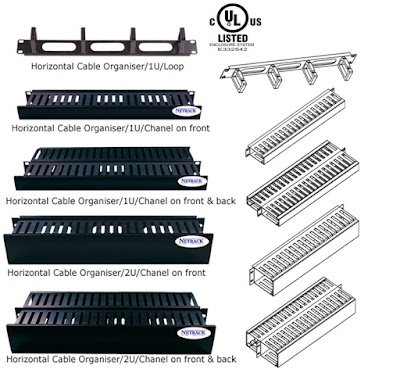What are the types of equipment necessary to manage server rack cables?
Cable management is one of the most crucial aspects of data center management; arranging them will ensure the proper functioning of the data center without downtime. There are various ways in which you can organise your cables to make your data center more functional and reliable:
- Horizontal cable manager: Horizontal cable managers allow you to manage cables that enter and exit through IT equipment; they are hollow tubes to have cables threaded into them and ideally placed between two equipment. These managers it is easy to arrange the wires without being tangled and also it can hold many cables, so they don’t droop onto the equipment.
- Vertical Cable manager: Vertical cable manager works with the help of horizontal cable manager; the cables must be routed through the horizontal cable manager to keep them tidy. These look pretty similar to horizontal cable managers, but they are placed vertically; you can mount them on both sides of the racks. The cables are tied with the help of zip ties or cinch straps for keeping them in place against gravity.
- Cable management arm: If you connect the cables on a sliding rack or shelf, you need a cable management arm—these help in increasing the accessibility of the slacks while the equipment is sliding out of the frame.
- Patch cable organiser: The organizers are pretty similar to horizontal cable managers, but they are designed to manage the excess cables. They act as an excellent alternative for 6-inch networking cables, and you can keep your cables organized in the absence of short wires as well.
- Offset cable tie bars: They are used to manage excess cables and also manage the weight equally. They can be placed between the IT equipment while taking less space. There are also holes all across the offset cable tie bars to ensure the efficient management of cables.
- Cable management tray: They are helpful if you want to route any cables across your rack; they do not have any opening to secure the wires; instead, they carry the wires on a bridge-like thing.
- Cinch Straps: Cinch straps are being widely used over zip ties as they are more durable and can be used more than once. It also reduces the risk of tightening the cables and do not break while opening the wires.
- Server rack cables: The best option for network cable management is an efficient cable rack. A cable rack helps you keep your cables organized and also helps in maintaining the temperature for better functioning. It is also essential to choose a manufacturer who understands your requirements and gives you the best solution. Netrack is a cable rack manufacturer, making high-quality products for its customers for critical IT operations.
If you are still confused about which cable management solutions you should opt for, you can always take the help of an expert like Netrack; India is a top rack and cable organiser manufacturer, making your IT operations easy and reliable for high load requirements. If you want more information regarding any IT enclosure, you can visit the following site: https://www.netrackindia.com/.



Comments
Post a Comment